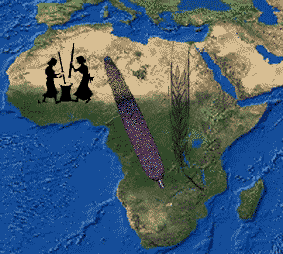
|
 |
 |

The Fifth International Workshop for African Archaeobotany will be held
2-5 July, 2006
at the Institute of Archaeology,
University College London.
|
The Fifth International Workshop for African Archaeobotany will be held
2-5 July, 2006 |
|
LINKS
|
IWAA participants are being encouraged to consider three themes around which to consider their archaeobotanical research (although other archaeobotanical papers will also be accepted): Agricultural beginnings: cultivation, domestication and early dispersal The origins of agriculture remains a major focus for archaeobotanical research, and many large questions remain unanswered in Africa: how many times were plants domesticated independently, when and under what environmental circumstances. New data is needed. Further resolution is needed on identifying domestication in some species, such as not cereal crops. Could some of the first cultivars in Africa have been garden crops and supplements, rather than staple foods? How can we identify pre-domestication cultivation in African contexts. How can we use archaeobotanical evidence to characterise the differences between the economies of foragers and farmers? Archaeobotany and political economy: cash crops, perennials and the organization of production After agriculture began later developments fed into increasing social complexity and major transformations in production. Archaeobotanical evidence has much to contribute to understanding the economic base of complex societies and exploring the transformations from subsistence farming to farming as wealth creation. Can we identify different patterns in the prganization of labour within or between sites, such as through the use of crop-processing models? What role do the spread of new 'cash-crops' such as fruits and fibre crops play in agricultural transformations or in increasingly differentiated economies. What are the scheduling and long-term landscape impact implicatiosn of shifts towards perrennial orchard crops? Gathered resources: foragers, wood fuels and the environmental impact Wild plants resources are important components of any economy. This is obviously the case for hunter-gatherers, but also for others. Wood used as fuel is probably the most ubiquitous form of plant utilization and wood charcoal the most common archaeological plant remain. Wood charcoal has much ton contribute to characterizing local environmental exploitation, and the nature of that environment. Can we also tease out indications for long term impacts or woodland management? |
|
Send mail to
d.fuller@ucl.ac.uk with
questions or comments about this web site.
|